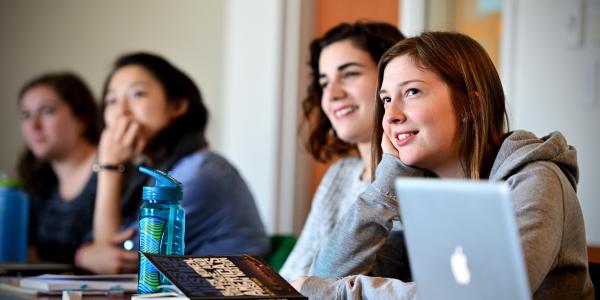Eight Arts & Sciences graduate students were honored for their achievements in undergraduate teaching and instruction.
Arts & Sciences recently announced the recipients of the annual Dean's Awards for Teaching Excellence. Graduate students from several departments and programs were selected for their exceptional contributions in the classroom.
“All of these awardees have excelled in the space of graduate student engagement with undergraduate teaching and learning,” said William Acree, associate vice dean of graduate education. “They are also among our most distinguished graduate student leaders. We’re excited to recognize the impact their work has had in the classroom and beyond."
Recipients were selected through a departmental nomination process that required support and input from multiple members involved in the teaching mission. Among the many achievements and approaches nominators highlighted were inclusive pedagogy and commitment to student success; the development of a classroom environment that welcomes diverse opinions, learning styles, and life experiences; lively and enthusiastic teaching that kept students engaged with course content and conversations; creativity in course and assignment design; and collaboration with faculty and other graduate students throughout the semester. Each awardee received a $1,500 prize and a certificate.
“Graduate training gives us a tremendously powerful opportunity to help our students hone their skills at communicating complex topics and transferring that knowledge to others,” said Sophia Hayes, vice dean of graduate education. “This award is one way that we can honor graduate students who develop distinctive abilities in the ‘art of teaching,’ and it’s a chance for Arts & Sciences to recognize and celebrate their achievements in the classroom.”
2023 Award Recipients
Emily Thompson, Art History and Archaeology
Thompson won praise for deftly handling the logistical challenges of hybrid teaching during the pandemic. One nominator noted she brings immense talent to her work as a graduate fellow in the Writing Center, where she leads workshops with “enormous verve, skill, and empathy.”
Shea McCollough, English
McCullough’s extensive knowledge of texts and his comfort with students of all strengths and backgrounds brought out superlatives from nominators, including one who called him “one of the most naturally gifted graduate student teachers I have ever witnessed.”
Sara Lucía Hernández, Romance Languages and Literatures, Spanish
Nominators cited her student-centered approach, the interdisciplinary scope of her instruction, and her skill at leading thoughtful discussions on a variety of complex topics while cultivating a safe and positive learning space.
Bobbie Brown, Biology
Brown received praise for her initiative, organizational skills, and self-sufficiency. She was also able to develop an easy rapport with students, making them feel welcome, comfortable, and ready to contribute.
Collin Merrick, Chemistry
In evaluations, one student wrote that Merrick was “perhaps the greatest asset in [CHEM] 261” and another called him “a major contributing factor to my success in this course” — testaments to his genuine concern for students and his willingness to spend extra time explaining difficult concepts.
Jodi McWhirter, Mathematics and Statistics
Nominators praised her ability to explain abstract mathematical concepts to non-math majors, a skill that she brought to frequent consultations outside of class and office hours, much to the gratitude of students.
Jake Funkhouser, Anthropology
Nominators noted his ability to engage students with a variety of materials and techniques, his campus engagement through the Center for Teaching and Learning’s Graduate Student Advisory Council, and his adaptability. Notably, he was able to incorporate zoo webcams into a course during COVID-19 restrictions.
Yanjie Li, Applied Linguistics/Education
Nominators cited Li’s gentle yet effective interpersonal teaching style as well as her use of photos, videos, and other media representing a variety of ethnicities, genders, and ages to create an inclusive learning environment.





